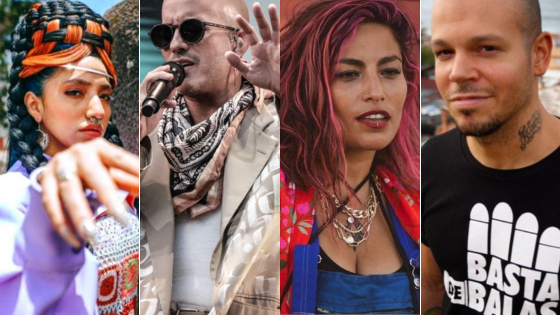Music has always been a catalyst for social change in Latin America, giving voice to the marginalized and sparking vital conversations about identity, justice, and equality. These artists champion this vital movement, inspiring meaningful action and advocating for a more inclusive society through their work.
Ana Tijoux:
This Chilean rapper and singer is celebrated for her politically charged lyrics and socially conscious sound. Through songs addressing feminism, indigenous rights, and social justice, Tijoux has emerged as a fierce advocate for marginalized communities across Latin America and beyond.
Born in France to exiled Chilean parents during the Pinochet dictatorship, Tijoux’s life and music are shaped by a profound awareness of social and political struggles. She cut her teeth in hip-hop with the group Makiza before embarking on a successful solo career.
Tijoux’s music consistently tackles themes of inequality, political corruption, and human rights abuses. Her work often draws on deeply personal experiences living under Pinochet’s regime, exploring its lingering impact on her life and family. The track “1977” serves as a poignant homage to her birth year and reflects on her identity as a Chilean woman in exile.
Tijoux utilizes her platform to champion social justice and amplify calls for political change. A vocal critic of police violence, gender inequality, and the suppression of indigenous communities in Chile, she’s become an iconic voice within the Latin American music scene, symbolizing resistance against oppression.
Residente (René Pérez Joglar):
This Puerto Rican rapper harnesses his music to shine a light on issues plaguing society, such as injustice, corruption, and inequality. His socially charged tracks like “Latinoamérica” and “Afilando los cuchillos” have fueled countless protests and movements.
One of Residente’s defining traits is the ability to weave personal experiences into broader social narratives. Born and raised in Puerto Rico, his work is infused with reflections on identity, colonialism, and resistance. His lyrics offer a potent mixture of poetry and protest, demanding critical engagement from listeners.
Residente’s impact and influence extends beyond soundwaves. He actively participates in a wide array of social and political movements throughout Latin America, fighting for environmental conservation, indigenous rights, and political reform. In 2016, Residente traced his genetic ancestry around the globe, resulting in a self-titled album reflecting his profound commitment to his roots and heritage.
Alongside music, Residente dedicates himself to philanthropic efforts that raise awareness about critical issues within Latin America. Collaborations with Amnesty International and Greenpeace underscore his ongoing advocacy for human rights and environmental protection, which has garnered numerous awards and even recognition from the United Nations.
Las Cafeteras:
Based in Los Angeles, Las Cafeteras’ infectious mix of traditional Mexican folk music, hip-hop, rock, and passionate activism amplifies the voices of marginalized communities in the United States and Mexico. Their music directly addresses societal issues like immigration, gentrification, and cultural preservation.
Las Cafeteras’ sound defies easy categorization, a testament to the collective’s dynamic personalities. They fuse classic Mexican instrumentation with the energy of urban styles, resulting in a vibrant soundscape that resonates with diverse audiences. Their lyrics seamlessly shift between English and Spanish, echoing the complex identities they represent.
Renata Flores:
This young indigenous singer-songwriter from Peru champions indigenous rights and celebrates cultural heritage. Flores, born in Huamanga, Ayacucho, was surrounded by Quechua culture, music, and language during her upbringing. These roots are clearly reflected in her unique musical style.
Flores expertly blends Quechua traditions with modern pop, capturing international attention with her fresh, empowering sound. Through her music, she proudly reclaims her indigenous identity as a source of strength and resilience. Singing in Quechua, a language spoken by millions across the Andean region, brings renewed visibility to a traditionally marginalized community.
The song “Tijeras” stands out as a potent anthem, shining a spotlight on gender violence and discrimination against indigenous women. Its powerful lyrics and haunting melody showcase Flores’ ability to tackle significant social issues through deeply moving music. Beyond the microphone, Flores advocates tirelessly for indigenous rights, land conservation, and the preservation of ancestral culture.
Mon Laferte:
This Chilean singer-songwriter has captured hearts with her impactful lyrics about feminism, gender violence, and LGBTQ+ rights. An iconic figure within the Latin American feminist movement, she leverages her voice to raise awareness about the ongoing struggles faced by women.
Laferte’s potent blend of rock, pop, and traditional Latin American elements creates a distinctive sonic identity. Her deeply personal lyrics explore life experiences and battles as a woman navigating a system steeped in male dominance.
Offstage, Laferte is known for her activism and philanthropic endeavors. She participates in numerous campaigns promoting gender equality, LGBTQ+ rights, and social justice, serving as a powerful role model for many.
Cultura Profética:
This iconic Puerto Rican reggae band spreads messages of peace, unity, and love. Formed in San Juan during the mid-1990s, Cultura Profética emerged from a vibrant, politically conscious music scene with its roots in the island’s rich heritage. Known for their infectious rhythms, soulful vocals, and thought-provoking lyrics, the band advocates for social justice, environmental action, and a brighter, more inclusive future. Songs like “Saca, prende y sorprende” and “La Complicidad” exemplify their positive and inspirational message.
These artists serve as powerful examples of how music can inspire positive change and work towards a more equitable world for all.


